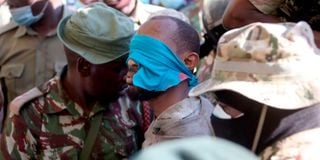Premium
Terrorists all but beaten in region

One of the three terror convicts after they were caught and brought back to Kamiti Prison on November 18, 2021.
Last Tuesday, two bombs went off in Kampala, the Ugandan capital, and a third was safely detonated by the authorities.
The first bomb went off close to a police station and two of the three people killed were police officers. The other one was in the vicinity of the parliament, which adjourned for the day.
The Islamic State terror group claimed responsibility as the authorities blamed the Allied Democratic Forces, a militant group which has pledged allegiance to IS and which originated in Uganda but is now based in the eastern parts of DR Congo.
An allied group split off and joined the Islamic State’s Central Africa Province group. An ISIS uprising has been tormenting the Mozambican government in the north of the country and it has had to call in the Rwandan army to help fight them.
About the same time, three terror suspects walked out of Kamiti Maximum Security Prison and were apprehended yesterday as they tried to make their way to Boni Forest, from where Al-Shabaab, the Somali terror group, operates.
Up north, there is fighting less than 50 kilometres from the Kenya-Ethiopia border with Oromo Liberation Front fighters joining the Tigray People’s Defence Forces in their battle to take Addis Ababa and topple the government of Abiy Ahmed, the Nobel Peace Prize winner of a Prime Minister, whose leadership has confounded a few and who finds himself in a tight corner with jails full of supposed enemies of the state and a city in danger of being besieged by hard fighters from the far north.
Boiled over a slow fire
Somalia, the perennial basket case, is in no stabler state than in the past with President Mohamed Farmaajo engaged in political and military dribbling, toppling regional governments and seeking a term extension without elections.
Of course, if the African Union forces abandon him, his fancy Turkish- and Middle East-trained army would probably crumble at the hands of Al-Shabaab and he would find himself being boiled over a slow fire by those fighters whose brutality is well known. And we would know, having suffered at their hands many times.
The only bright spot is down south, where the professionalism of the Tanzanian army held and there was a peaceful, though not necessary uneventful, transition from the cantankerous John Magufuli to President Suluhu Hassan, who is patiently consolidating power and taking over the reins with a degree of firmness.
Kampala is a beautiful, peaceful city, its people unscarred by the sheer horror of terrorism that we have experienced again and again. Now, given the brutality of the attacks we have suffered, the events in Kampala look like amateur hour. The critical installations were not penetrated; the casualties were nothing compared to the worst the region has seen.
The danger is that these attacks could have been a test run, a testing of defences, proof that a device can be assembled undetected and driven to critical, high-security installation in the heart of the city. If this is the case, and I fervently hope it is not, then Ugandans have some trouble brewing.
If, on the other hand, these were a bunch of fellows from eastern DRC working with manuals from Hezbollah in the jungle, self-taught, untested and over-enthusiastic, then President Yoweri Museveni’s over-militarised national security apparatus will make mincemeat of them.
Please note the speed with which the fourth suspected suicide bomber was identified and ruthlessly run down.
I was looking at the photos trying to see what kind of forces Mr Museveni’s security bosses would deploy to respond to these attacks. He is an expert at many things: Like security, military and history. I don’t know whether he takes advice or gives it on these matters, to work an old joke.
I know Uganda has good, battle-tested soldiers, whom I did not see in the photos. What I saw were heavy-set Uganda People’s Defence Forces soldiers armed with AKs and old machine guns, maybe the same weapons Mr Museveni fought with in the bush, clearly the lower-quality kind of soldiers who guard installations and fight fires and not the elite forces who were possibly not needed.
A consequence of our suffering at the hands of Al-Shabaab is, we have trained, armed and deployed very good police units with skills traditionally seen only in the GSU Recce Company assault teams. And not only armed with what looks like very sophisticated guns, I’m told they know how to use them. You can be sure the Ugandan government will be evaluating its capabilities and improving them.
So, not only do we have instability all around us, but we now have a peaceful, friendly and organised neighbour, whose economy could be disrupted and vital resources diverted to fight a war at home.
The speed with which the Kamiti fugitives were hunted down and the resolute action against the Prisons bosses was a breath of fresh air. President Museveni should proceed in the same swift fashion and send his best men—and women—to go have a look at that ADF gang in the bush and save Ugandans loads of bother.





